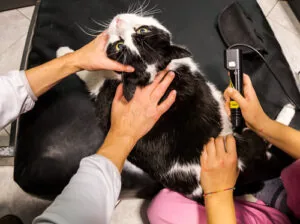My Dog Is Shivering: Should I Be Concerned?

As a pet owner, it’s natural to worry when you notice your dog shivering. Shivering can be a sign of various issues, some benign and others more serious. Understanding the reasons behind your dog’s shivering is crucial in determining whether a visit to the vet is necessary. This blog will explore the common causes of shivering in dogs, when to seek veterinary care, and how Dyer Animal Clinic can help.
Why Would My Dog Be Shivering?
Cold Weather and Temperature Changes
One of the most straightforward reasons for a dog to shiver is due to cold weather. Just like humans, dogs can feel cold, especially if they have short fur or are not accustomed to low temperatures. When a dog is exposed to cold weather, their muscles may contract to generate heat, resulting in shivering. If you notice your dog shivering during a walk on a chilly day, consider getting them a doggy sweater or limiting their time outside.
Anxiety and Stress
Dogs can also shiver when they are anxious or stressed. Common triggers for anxiety-induced shivering include loud noises like thunderstorms or fireworks, separation anxiety, or unfamiliar environments. If your dog starts shivering during stressful situations, it’s essential to identify the cause and provide comfort and reassurance. Calming techniques, such as gentle petting, using a calming vest, or creating a safe space, can help alleviate your dog’s anxiety.
Excitement
Excitement can be another reason your dog is shivering. When dogs get overly excited, their bodies can tremble due to the adrenaline rush. This type of shivering is typically harmless and subsides once the excitement levels off. However, if your dog frequently shivers from excitement, it may be helpful to work on calming techniques to help them manage their energy.
Health-Related Causes of Shivering
Pain and Discomfort
Shivering can sometimes be a sign that your dog is in pain or discomfort. Conditions such as arthritis, injuries, or internal issues can cause a dog to shiver. If your dog is shivering and showing other signs of pain, such as limping, whining, or reluctance to move, it’s essential to schedule a veterinary appointment. Pain management and appropriate treatment can significantly improve your dog’s quality of life.
Illnesses and Infections
Certain illnesses and infections can cause shivering in dogs. Conditions like fever, nausea, or infections can lead to shivering as the body attempts to fight off the ailment. If your dog is shivering and exhibiting other symptoms such as vomiting, diarrhea, or lethargy, it’s crucial to seek veterinary care immediately. Early diagnosis and treatment can prevent more severe health issues from developing.
Hypoglycemia
Hypoglycemia, or low blood sugar, can cause shivering in dogs, particularly in small breeds or puppies. Signs of hypoglycemia include shivering, weakness, confusion, and even seizures. If you suspect your dog is experiencing low blood sugar, contact your veterinarian promptly. Managing your dog’s diet and ensuring they have regular meals can help prevent hypoglycemic episodes.
When to Seek Veterinary Care
- Persistent Shivering: If your dog is shivering persistently and there is no apparent cause, it’s essential to seek veterinary care. Persistent shivering can be a sign of underlying health issues that require professional attention. At Dyer Animal Clinic, our experienced veterinarians can conduct a thorough examination to determine the cause of your dog’s shivering and recommend appropriate treatment.
- Accompanying Symptoms: When shivering is accompanied by other concerning symptoms, it’s crucial to consult with a veterinarian. Symptoms to watch for include vomiting, diarrhea, lethargy, loss of appetite, or difficulty breathing. These signs can indicate a more severe health issue that needs immediate attention.
- Age and Breed Considerations: Certain breeds and older dogs are more susceptible to conditions that cause shivering. For instance, small breeds like Chihuahuas are prone to hypoglycemia, and senior dogs may experience arthritis or other age-related conditions. If your dog’s breed or age makes them more vulnerable to health issues, regular veterinary check-ups are vital. Our team at Dyer Animal Clinic can provide tailored care to address your dog’s specific needs.
How Dyer Animal Clinic Can Help
At Dyer Animal Clinic, we offer comprehensive examinations to identify the cause of your dog’s shivering. Our skilled veterinarians will assess your dog’s overall health, review their medical history, and perform any necessary tests to determine the underlying issue. By understanding the root cause, we can develop a personalized treatment plan to ensure your dog’s well-being.
Pain Management and Treatment
If pain or discomfort is causing your dog to shiver, our clinic provides effective pain management solutions. From medications to physical therapy, we offer a range of treatments to alleviate your dog’s pain and improve their quality of life. Our goal is to ensure your pet remains comfortable and happy.
Ongoing Support and Monitoring
We believe in providing ongoing support and monitoring for our patients. Whether your dog has a chronic condition or requires follow-up care after an illness, Dyer Animal Clinic is here to help. We offer regular check-ups and monitoring to ensure your dog’s health is maintained and any issues are addressed promptly.
Promoting Your Dog’s Health and Comfort
Understanding why your dog is shivering and knowing when to seek veterinary care is essential for their health and comfort. At Dyer Animal Clinic, we are dedicated to providing the best care for your furry friend. If you notice your dog shivering and are concerned about their well-being, please call us at (219) 865-3737 to schedule an appointment. Our experienced team is here to help your pet live a happy and healthy life.
Share This Post
Recent Posts
About Dyer Animal Clinic
We are a place where pets and their people can feel at home. It's a place where wellness is maintained and supported from the time they’re newborns through their golden years.






